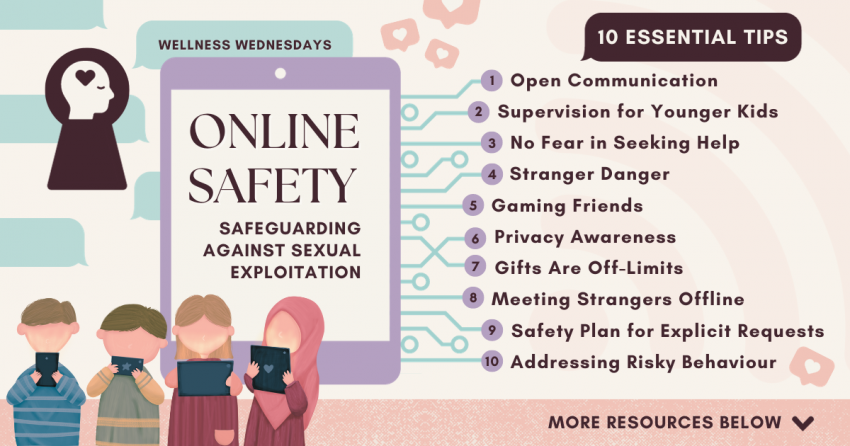With winter break on the horizon and kids gearing up for more online activities, it’s crucial to be aware of the increasing risks of online exploitation. As the digital landscape evolves, children may encounter uncomfortable situations, often feeling reluctant to share these experiences with their parents. Here are some essential tips to help you safeguard your children in the online realm. Stay informed and proactive in ensuring a secure digital environment for your kids anytime, but especially during the long breaks.
10 Essential Tips for Online Safety:
- Open Communication: Regularly discuss the apps your child uses, set clear boundaries, and document them together
- Supervision for Younger Kids: If your child is under 10, supervise their online activities
- No Fear in Seeking Help: Assure your child they won’t face consequences for asking for help, avoiding potential limitations on their online activities
- Stranger Danger: Remind your child that online friends are strangers; caution against sharing personal information
- Gaming Friends: Advise against adding online gaming friends to other social media platforms
- Privacy Awareness: Teach your child to avoid sharing sensitive information online, including age, location, and personal details
- Gifts Are Off-Limits: Instruct your child never to accept gifts, such as money, gift cards, or codes, from online friends
- Meeting Strangers Offline: Explain the dangers of meeting online friends in person without a parent or safe adult
- Safety Plan for Explicit Requests: Create a plan with your child for handling requests for explicit content (stop, tell a safe adult, report, block)
- Addressing Risky Behavior: If you notice risky online behavior, engage in a conversation with your child and collaboratively find a safer solution
Depending on your specific concerns or the age group of the children involved, you might consider adding or emphasizing the following points:
- Regularly Monitor Devices: Check your child’s devices and review their online activities periodically to ensure compliance with the established rules
- Teach Critical Thinking: Encourage your child to question information online and think critically about the content they encounter
- Update Privacy Settings: Instruct your child on how to adjust privacy settings on social media and gaming platforms to control who can access their information
- Use Strong Passwords: Emphasize the importance of strong, unique passwords for different accounts to enhance security
- Educate About Cyberbullying: Discuss the concept of cyberbullying, its effects, and the importance of reporting any incidents
- Be Aware of Location Settings: Remind your child to disable location-sharing features on apps and social media platforms to protect their privacy
- Model Good Behavior: Demonstrate responsible online behavior and etiquette, as children often learn by example
- Stay Informed About Apps: Keep yourself informed about the latest apps and online trends to better guide your child’s digital experiences
Remember that the digital landscape is dynamic, and new challenges may emerge. Staying informed and maintaining open communication with your child are ongoing practices for effective online safety.
RESOURCES FOR YOUTH
Jan 26, 2024 UPDATE: B.C. launches concrete actions to keep kids safe online
In British Columbia, it’s against the law to share or threaten to share an intimate image of someone without their consent. Take back your control by clicking here and filing a claim to have your image(s) taken down
Anonymous Reporting:
- Visit CyberTip to make an anonymous report
- Contact the confidential line at 1-866-658-9022
Children of the Street:
- Text the confidential line at (604) 866-6779
- Available anytime, with quick responses during office hours (Mon-Fri, 8:30 AM to 4:00 PM)
- For non-urgent concerns, email at info@childrenofthestreet.com
- Provides regional resources based on your location
Canadian Human Trafficking Hotline:
- Hotline open 24/7
- Utilize the chat function online or call 1-833-900-1010
Youth Against Violence Line:
- Call 1-800-680-4264 to talk one-on-one with a support worker, available 24/7
- Email at info@youthagainstviolenceline.com
- Confidential and anonymous assistance for safety concerns
- Multilingual service for communication in your language
- Concerned Individuals (parents, teachers, caregivers, etc.) are welcome to call for information and assistance on youth-related issues
RESOURCES FOR CAREGIVERS – How to Talk to Your Child About Online Sexual Exploitation:
Educate Yourself: Learn about online sexual exploitation through reliable resources.
- Children of the Street: Offers a video series, parent toolkit, and additional resources
- Canadian Centre for Child Protection: Provides educational materials
- Cybertip.ca: Allows anonymous reporting, witnessing a 150% increase in the last 6 months
Start Early Discussions: Initiate conversations about online safety from an early age.
Be a Safe Person: Be open, approachable, and authentic. Normalize uncomfortable conversations to encourage your child to confide in you.
Take the Time: Stick to the facts about sexual exploitation. Engage in meaningful dialogue with your child.
Be Patient: Understand that your child may appear disinterested but continue the conversation. Persistence is key; keep trying, as it will pay off.
Click here to download an Online Safety Plan that you can fill out with older children.
